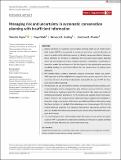Managing risk and uncertainty in systematic conservation planning with insufficient information
Abstract
1. Recent advances in systematic conservation planning make use of modern portfolio theory - a framework to construct and select optimal allocation of assets - to address the challenges posed by climate change uncertainty. However, these methods are difficult to implement for fine scale conservation planning when the information on future climate scenarios is insufficient. Insufficient information makes the estimators of the key inputs in the optimisation procedure unreliable leading to technical problems for the construction of optimal asset allocation. 2. We identify three statistical methods - Constant Correlation Model, the Ledoit-Wolf approach and the weighted non-negative least-squares approach - that can overcome the lack of sufficient information and enable the use of modern portfolio theory for fine scale conservation planning. 3. We illustrate the use of the three methods for identifying efficient portfolio allocation strategies, i.e. strategies that give minimum amount of risk for a chosen level of return or maximum return for a chosen level of risk, using case studies of wetland conservation planning in North America and coastal conservation planning in Australia. We compare conservation planning strategies with complete information using standard portfolio theory and with insufficient information using the three methods to highlight their advantages and disadvantages. We find the Ledoit-Wolf and weighted non-negative least-squares approaches perform well and can identify risk-return out-comes that are close to those identified with complete information. 4. The methods presented in this study broaden the range of cases where the application of modern portfolio theory is possible in conservation planning to enhance its uptake and lead to more efficient allocation of conservation resources.
Citation
Popov , V , Shah , P , Runting , R K & Rhodes , J R 2021 , ' Managing risk and uncertainty in systematic conservation planning with insufficient information ' , Methods in Ecology and Evolution , vol. Early View , 13725 . https://doi.org/10.1111/2041-210X.13725
Publication
Methods in Ecology and Evolution
Status
Peer reviewed
ISSN
2041-210XType
Journal article
Description
This research was supported by Japan Society for the Promotion of Science and by the Okinawa Institute of Science and Technology Graduate University. RKR was supported by an Australian Research Council Discovery Early Career Research Award (DE210100492). JRR was supported by an Australian Research Council Future Fellowship (FT200100096) .Collections
Items in the St Andrews Research Repository are protected by copyright, with all rights reserved, unless otherwise indicated.

